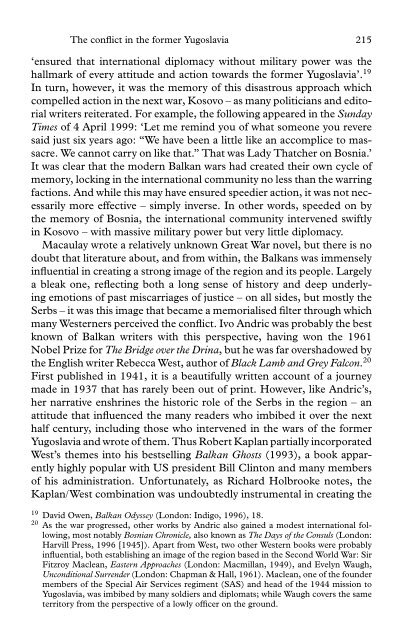Memory and Power in Post-War Europe: Studies in the Presence of ...
Memory and Power in Post-War Europe: Studies in the Presence of ...
Memory and Power in Post-War Europe: Studies in the Presence of ...
You also want an ePaper? Increase the reach of your titles
YUMPU automatically turns print PDFs into web optimized ePapers that Google loves.
The conflict <strong>in</strong> <strong>the</strong> former Yugoslavia 215<br />
‘ensured that <strong>in</strong>ternational diplomacy without military power was <strong>the</strong><br />
hallmark <strong>of</strong> every attitude <strong>and</strong> action towards <strong>the</strong> former Yugoslavia’. 19<br />
In turn, however, it was <strong>the</strong> memory <strong>of</strong> this disastrous approach which<br />
compelled action <strong>in</strong> <strong>the</strong> next war, Kosovo – as many politicians <strong>and</strong> editorial<br />
writers reiterated. For example, <strong>the</strong> follow<strong>in</strong>g appeared <strong>in</strong> <strong>the</strong> Sunday<br />
Times <strong>of</strong> 4 April 1999: ‘Let me rem<strong>in</strong>d you <strong>of</strong> what someone you revere<br />
said just six years ago: “We have been a little like an accomplice to massacre.<br />
We cannot carry on like that.” That was Lady Thatcher on Bosnia.’<br />
It was clear that <strong>the</strong> modern Balkan wars had created <strong>the</strong>ir own cycle <strong>of</strong><br />
memory, lock<strong>in</strong>g <strong>in</strong> <strong>the</strong> <strong>in</strong>ternational community no less than <strong>the</strong> warr<strong>in</strong>g<br />
factions. And while this may have ensured speedier action, it was not necessarily<br />
more effective – simply <strong>in</strong>verse. In o<strong>the</strong>r words, speeded on by<br />
<strong>the</strong> memory <strong>of</strong> Bosnia, <strong>the</strong> <strong>in</strong>ternational community <strong>in</strong>tervened swiftly<br />
<strong>in</strong> Kosovo – with massive military power but very little diplomacy.<br />
Macaulay wrote a relatively unknown Great <strong>War</strong> novel, but <strong>the</strong>re is no<br />
doubt that literature about, <strong>and</strong> from with<strong>in</strong>, <strong>the</strong> Balkans was immensely<br />
<strong>in</strong>fluential <strong>in</strong> creat<strong>in</strong>g a strong image <strong>of</strong> <strong>the</strong> region <strong>and</strong> its people. Largely<br />
a bleak one, reflect<strong>in</strong>g both a long sense <strong>of</strong> history <strong>and</strong> deep underly<strong>in</strong>g<br />
emotions <strong>of</strong> past miscarriages <strong>of</strong> justice – on all sides, but mostly <strong>the</strong><br />
Serbs – it was this image that became a memorialised filter through which<br />
many Westerners perceived <strong>the</strong> conflict. Ivo Andric was probably <strong>the</strong> best<br />
known <strong>of</strong> Balkan writers with this perspective, hav<strong>in</strong>g won <strong>the</strong> 1961<br />
Nobel Prize for The Bridge over <strong>the</strong> Dr<strong>in</strong>a, but he was far overshadowed by<br />
<strong>the</strong> English writer Rebecca West, author <strong>of</strong> Black Lamb <strong>and</strong> Grey Falcon. 20<br />
First published <strong>in</strong> 1941, it is a beautifully written account <strong>of</strong> a journey<br />
made <strong>in</strong> 1937 that has rarely been out <strong>of</strong> pr<strong>in</strong>t. However, like Andric’s,<br />
her narrative enshr<strong>in</strong>es <strong>the</strong> historic role <strong>of</strong> <strong>the</strong> Serbs <strong>in</strong> <strong>the</strong> region – an<br />
attitude that <strong>in</strong>fluenced <strong>the</strong> many readers who imbibed it over <strong>the</strong> next<br />
half century, <strong>in</strong>clud<strong>in</strong>g those who <strong>in</strong>tervened <strong>in</strong> <strong>the</strong> wars <strong>of</strong> <strong>the</strong> former<br />
Yugoslavia <strong>and</strong> wrote <strong>of</strong> <strong>the</strong>m. Thus Robert Kaplan partially <strong>in</strong>corporated<br />
West’s <strong>the</strong>mes <strong>in</strong>to his bestsell<strong>in</strong>g Balkan Ghosts (1993), a book apparently<br />
highly popular with US president Bill Cl<strong>in</strong>ton <strong>and</strong> many members<br />
<strong>of</strong> his adm<strong>in</strong>istration. Unfortunately, as Richard Holbrooke notes, <strong>the</strong><br />
Kaplan/West comb<strong>in</strong>ation was undoubtedly <strong>in</strong>strumental <strong>in</strong> creat<strong>in</strong>g <strong>the</strong><br />
19 David Owen, Balkan Odyssey (London: Indigo, 1996), 18.<br />
20 As <strong>the</strong> war progressed, o<strong>the</strong>r works by Andric also ga<strong>in</strong>ed a modest <strong>in</strong>ternational follow<strong>in</strong>g,<br />
most notably Bosnian Chronicle, also known as The Days <strong>of</strong> <strong>the</strong> Consuls (London:<br />
Harvill Press, 1996 [1945]). Apart from West, two o<strong>the</strong>r Western books were probably<br />
<strong>in</strong>fluential, both establish<strong>in</strong>g an image <strong>of</strong> <strong>the</strong> region based <strong>in</strong> <strong>the</strong> Second World <strong>War</strong>: Sir<br />
Fitzroy Maclean, Eastern Approaches (London: Macmillan, 1949), <strong>and</strong> Evelyn Waugh,<br />
Unconditional Surrender (London: Chapman & Hall, 1961). Maclean, one <strong>of</strong> <strong>the</strong> founder<br />
members <strong>of</strong> <strong>the</strong> Special Air Services regiment (SAS) <strong>and</strong> head <strong>of</strong> <strong>the</strong> 1944 mission to<br />
Yugoslavia, was imbibed by many soldiers <strong>and</strong> diplomats; while Waugh covers <strong>the</strong> same<br />
territory from <strong>the</strong> perspective <strong>of</strong> a lowly <strong>of</strong>ficer on <strong>the</strong> ground.
















